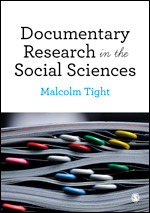Documentary Research in the Social Sciences
This guest post from Dr. Malcolm Tight builds on the May 2021 series of posts about Finding Data in Documents and Datasets. Use the code MSPACEQ123 for a 20% discount, valid until March 31, 2023.
Overview

Documentary research is a critical aspect of research in the social sciences and beyond. Indeed, it might be said to be endemic, as all researchers use documents – whether they be academic articles, national policy statements, historical records, online materials or personal accounts - to some extent in their research. So all social researchers should be aware of the issues involved in using documents in research – context, credibility, interpretation – which are common to other forms of social research.
Social researchers may also wish to consider making documents the focus, or a major part, of their research. There are so many documents out there, many of them freely accessible (increasingly online), that contain so much data, quantitative and qualitative, of relevance to a huge variety of topics and interests. It surely makes sense to consider what they have to offer, as it is now possible to conduct so much research without leaving your home or meeting anyone.
Accessing Documents
Many documents are freely available, and increasingly so online, particularly if you are working or studying in higher education. University libraries subscribe to online journals and e-books and make many other resources available through their websites. Public documents produced by governments, international agencies and other organizations can also be readily accessed online.
Private and internal documents may, however, be more difficult to access, unless you are closely connected to or have good relations with the people and organizations involved. You will need to identify the ‘gatekeepers’ involved, and explain and justify your research plans, focusing in particular on what the benefits might be to them.
Sampling
Sampling is something to be considered carefully in analysing documents, just as it is in other forms of social research. At one extreme, as when conducting a systematic literature review, it may be desirable and feasible to examine all of the documents, or at least all of those you can access, on a particular topic. At the other extreme, the focus may be on a single, highly significant, document, such as a recent government statement or a religious text.
In between these extremes, documentary researchers need to think about sampling more carefully. They might choose to examine the same documents (e.g. company reports, university mission statements) from a representative sample, national or international, of the organizations involved in producing them. They might analyse successive versions of the same document (e.g. annual statements, editions of important books) from the same organization or organizations. Or they could follow a trail from document to document, focusing on their linkages and relationships.
Ethical Issues
Ethical issues in documentary research are often much simpler or easier than in other forms of research. If the documents being analysed are published (e.g. as books, policy documents, webpages) then there is no real need for ethical approval; though this may still be required – but should be straightforward - if you are doing the research for an organization or as part of a degree.
For other kinds of documents (e.g. private letters, unpublished drafts, internal papers), when you have permission to use them, more care needs to be taken. In the contemporary world, this care also needs to be extended if researching the wealth of personal documentation freely available online. As in all social research, the underlying aim should be to cause no harm.
First-time Documentary Researchers
As a social researcher you will have used documents in your research before, whether you thought of it as documentary research or not. You may, however, be contemplating analysing documents as the major or a substantive part of a research project for the first time. In that case, spending some time considering the possibilities this opens up might be very helpful.
Documentary research can be particularly useful in comparison (or triangulation) with other forms of research (e.g. interviews, surveys, observations). How does the policy statement compare with observed or stated practice? Are the official statistics (on health care, poverty or immigration) borne out in individuals’ experiences?
If you have the choice, you should also bear in mind your personal preferences. Some researchers enjoy spending lots of time alone in archives or interrogating statistical records online. If that’s not you, you might choose to limit the extent of documentary analysis in your research, but you’ll still need to do some of it.















Learn about qualitative data analysis approaches for narrative and diary research in these open access articles.